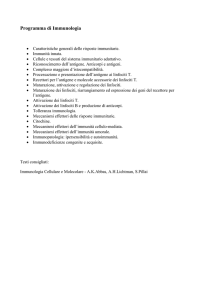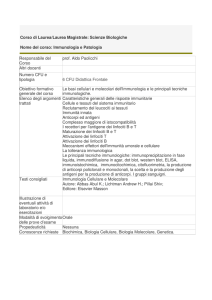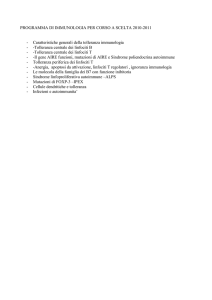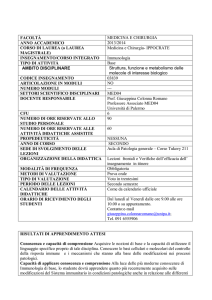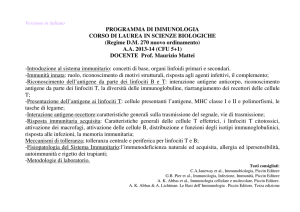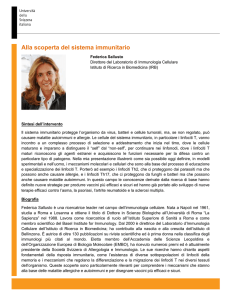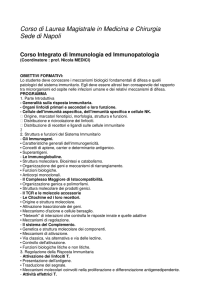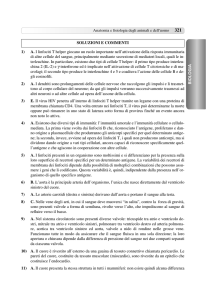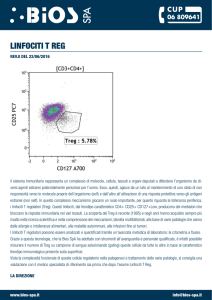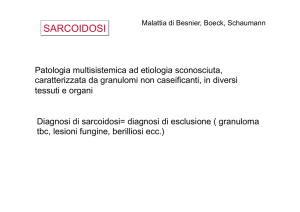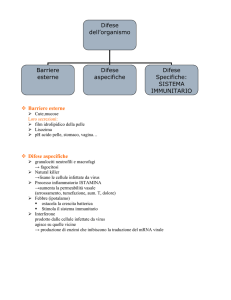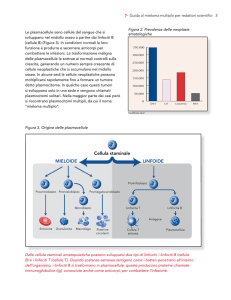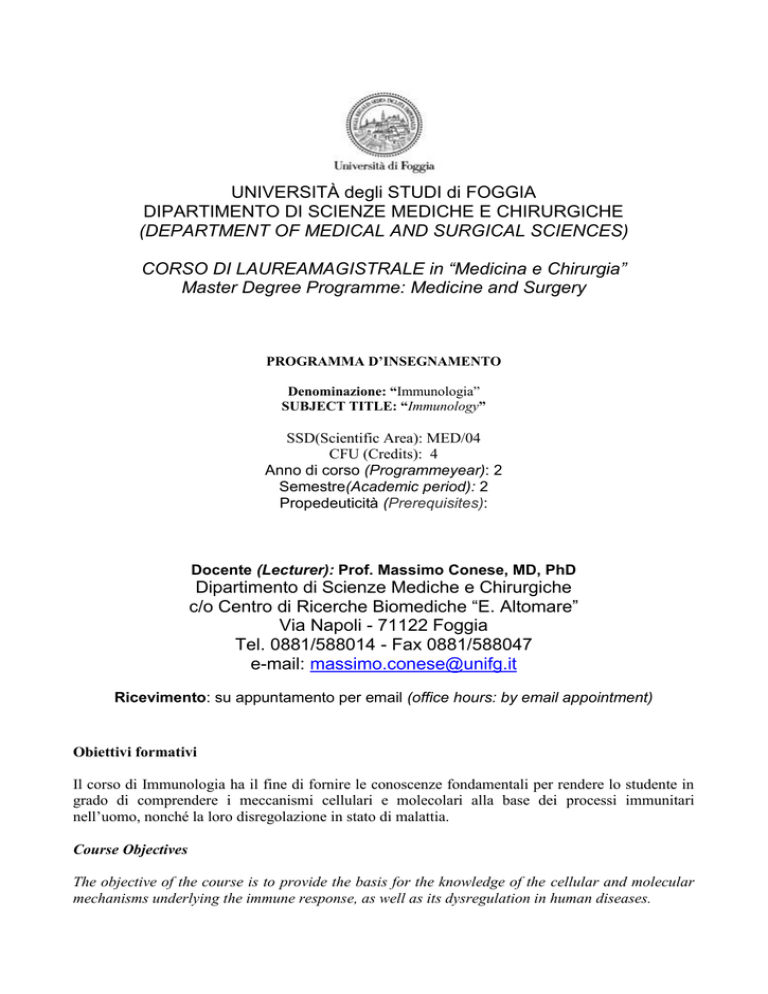
UNIVERSITÀ degli STUDI di FOGGIA
DIPARTIMENTO DI SCIENZE MEDICHE E CHIRURGICHE
(DEPARTMENT OF MEDICAL AND SURGICAL SCIENCES)
CORSO DI LAUREAMAGISTRALE in “Medicina e Chirurgia”
Master Degree Programme: Medicine and Surgery
PROGRAMMA D’INSEGNAMENTO
Denominazione: “Immunologia”
SUBJECT TITLE: “Immunology”
SSD(Scientific Area): MED/04
CFU (Credits): 4
Anno di corso (Programmeyear): 2
Semestre(Academic period): 2
Propedeuticità (Prerequisites):
Docente (Lecturer): Prof. Massimo Conese, MD, PhD
Dipartimento di Scienze Mediche e Chirurgiche
c/o Centro di Ricerche Biomediche “E. Altomare”
Via Napoli - 71122 Foggia
Tel. 0881/588014 - Fax 0881/588047
e-mail: [email protected]
Ricevimento: su appuntamento per email (office hours: by email appointment)
Obiettivi formativi
Il corso di Immunologia ha il fine di fornire le conoscenze fondamentali per rendere lo studente in
grado di comprendere i meccanismi cellulari e molecolari alla base dei processi immunitari
nell’uomo, nonché la loro disregolazione in stato di malattia.
Course Objectives
The objective of the course is to provide the basis for the knowledge of the cellular and molecular
mechanisms underlying the immune response, as well as its dysregulation in human diseases.
Risultati d’apprendimento attesi
Alla fine del corso lo studente dovrà essere in grado di conoscere i meccanismi di difesa contro le
infezioni virali, batteriche, fungine e parassitarie, ma anche il ruolo del sistema immune nelle
principali immunoreazioni autoimmuni ed atopiche, nel rigetto dei trapianti di organo, nella malattia
da trapianto contro l’ospite, e nelle immunodeficienze genetiche ed acquisite.
Learning outcomes
At the end of the course, the student will know the defense mechanisms against the viral, bacterial,
mycotic and parasitic infections, as well as the role of the immune system in the main autoimmune
and atopic diseases, in the transplant rejection, in the graft versus host disease, and in the genetic
and acquired immunodeficencies.
Organizzazione didattica (Teachingorganization): Lezioni frontali con supporto
audiovisivo (Lectureswith audiovisualsupport).
Lezioni ex cathedra (Lectures): CFU (Credits) 4; Ore (Hours): 40
Esercitazioni (Practicalactivities): CFU (Credits) --; Ore (Hours): -Altre attività formative (Otheractivities): CFU (Credits) --; Ore (Hours): -Modalità d’erogazione (tradizionale/a distanza/mista): Tradizionale
Course modality: Traditional
Modalità di verifica dell’apprendimento: Esame orale.
Examinationmethod: Oralexamination.
Programma dettagliato:
1. IMMUNITA’ INNATA.
Componenti: barriere epiteliali, fagociti, cellule NK.Il sistema del complemento. Ruolo degli
interferoni
2. RICONOSCIMENTO DELL’ANTIGENE
Struttura molecolare degli anticorpi.Il recettore per l’antigene sui linfociti T e suoi c-recettori.
3. SVILUPPO DEL REPERTORIO DEI LINFOCITI
Riarrangiamento primario dei geni per le immunoglobuline e dei recettori dei linfociti T.
Diversificazione secondaria del repertorio di anticorpi.
4. PRESENTAZIONE DELL’ANTIGENE AI LINFOCITI T
Processamento dell’antigene mediante l’immunoproteasoma e l’endocitosi. Il sistema maggiore di
istocompatibilità. Risposta ai superantigeni.
5. SVILUPPO E SOPRAVVIVENZA DEI LINFOCITI
Maturazione dei linfociti B e dei linfociti T.Selezione positiva e negativa nel midollo osseo e nel
timo.Sopravvivenza e maturazione dei linfociti nei tessuti linfoidi periferici.
6. RISPOSTA IMMUNITARIA DEI LINFOCITI T
Priming delle cellule T naive da parte delle cellule dendritiche attivate. Citochine e loro
recettori.Linfociti T citotossici.Linfociti T helper 1 ed attivazione macrofagica.
7. RISPOSTA IMMUNITARIA UMORALE
Linfociti T helper 2 ed attivazione dei linfociti B.Antigeni timo-dipendenti e antigeni timoindipendenti.Distribuzione e funzioni degli isotipiimmunoglobulinici.La distruzione dei patogeni
rivestiti da anticorpi attraverso i recettori Fc.
8. IL SISTEMA IMMUNITARIO DELLE MUCOSE
9. IL SISTEMA IMMUNITARIO IN SITUAZIONI PATOLOGICHE
Strategie dei microrganismi per evadere l’immunità dell’ospite.Malattie congenite da
immunodeficienza.La sindrome da immunodeficienza acquisita.Reazioni di ipersensibilità.Malattie
autoinfiammatorie.Autoimmunità: basi genetiche e ambientali.Linfociti T regolatori.Meccanismi
patogenetici nell’autoimmunità. Immunologia dei trapianti.
Teaching programme:
1. INNATE IMMUNITY.
Epithelial barriers, phagocytes, Natural Killer cells. The system of complement. Role of interferons.
2. ANTIGEN RECOGNITION
Molecular structure of the B-cell receptor and antibodies. The T-cell receptor and its co-receptors.
3. DEVELOPMENT OF THE RECEPTOR REPERTOIRE
Rearrangement of genes encoding for the B-cell and T-cell receptors. Secondarydiversification of
the antibodyrepertoire.
4. ANTIGEN PRESENTATION TO T LYMPHOCYTES
Antigen processing through the immunoproteasome and the endocytic pathways. The major
histocompatibility complex. Response to superantigens.
5. DEVELOPMENT AND SURVIVAL OF LYMPHOCYTES
Maturation of B and T lymphocytes. Positive and negative selection of T lymphocytes in bone
marrow and thymus. Maturation and survival of lymphocytes in peripheral lymphoid tissues.
6. CELL-MEDIATE IMMUNE RESPONSE
Primingof naive T cells by activateddendriticcells. Cytokines and theirreceptors. Cytotoxic T
lymphocytes. T helper 1 lymphocytes and macrophagic activation.
7. HUMORAL IMMUNE RESPONSE
Activation of B cells by T helper 2 lymphocytes. Thymus-dependent and independent antigens.
Distribution and functions of the immunoglobulin isotypes. The destruction of antibody-coated
pathogens via Fc receptors.
8.THE MUCOSAL IMMUNE SYSTEM
9. IMMUNOPATHOLOGY
Pathogen strategies for overcoming host immune reponses. Genetically-determined
immunodeficiencies.
The
acquiredimmunodeficiencysyndrome.
Hypersensitivityreactions.
Autoinflammatory diseases. Autoimmunity: genetic and environment basis. Regulatory T cells.
Pathogenic mechanisms in autoimmune diseases. Transplantation immunology of transplants.
Testi consigliati (Textbooks)
Immunologia cellulare e molecolare
di Abul K. Abbas, Andrew H. Lichtman, Shiv Pillai
Il Sistema Immunitario
di Peter Parham
Immunobiologia
di Janeway, Murphy, Travers, Walport
Materiale integrativo verrà messo a disposizione degli studenti durante le lezioni.
(course handouts and transparencies will be made available to students)
,
Obblighi di frequenza (se previsti dal Regolamento del CdS): Obbligatorio
Class attendance: compulsory
Possibili lingue straniere (Additionalforeignlanguages): —
Il Docente
Massimo Conese

